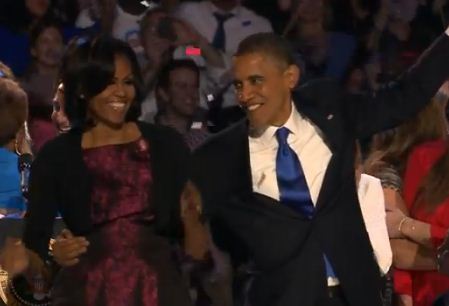US industry optimistic on Obama's re-election
09 November 2012
The US nuclear energy industry appears confident that President Barack Obama's second term in the White House will oversee a continued central role for the nuclear industry at the heart of the country's energy policies.
 |
| Four more years: President Obama celebrates his re-election with wife Michele (Image: barackobama.com) |
Martin Fertel, president and CEO of the Washington-based Nuclear Energy Institute (NEI), noted that Obama had explicitly mentioned in his comprehensive economic plan "the need for a significant contribution from nuclear energy to achieve the administration's goals." The President had spoken of "the need to expand domestic energy production and implement a cohesive national energy policy during his second term," Fertel said, and that "low-carbon nuclear energy facilities must be a key part of this new electricity generation mix for the nation to successfully achieve its economic and environmental goals."
Fertel said that despite a slowly recovering economy, the US Department of Energy was predicting a 21% growth in electricity demand by 2030, requiring the equivalent of more than 200 large power plants and this would have to include nuclear facilities. "Energy security and national security are intertwined and neither should ever be a partisan issue," he said.
During the election campaign, the views of both Obama and his rival Mitt Romney were consistent with respect to nuclear energy, "which echoes in large part the bipartisan support that long has prevailed in Congress and among all Americans," Fertel said.
Industry issues
According to the NEI, the US nuclear industry hopes and expects several issues to be addressed by the new administration when it takes office in 2013.
In a recent report, the NEI said that in a comparison of five leading nuclear supplier nations "the US export control regime places (US companies) at a serious disadvantage next to their competitors in the international export market." The analysis, conducted by the law firm Pillsbury Winthrop Shaw Pittman, said the US system was "more complex and difficult to navigate, evidenced by the division of export licensing and authorization powers among four agencies versus one or two at the most in the other nations." It contained added restrictions and legal and bureaucratic hurdles that exceeded international norms, concluding that the US was "significantly less efficient in processing export licences."
In August, Fertel was a joint-signatory to a letter to Hilary Clinton, the current Secretary of State, urging the Obama administration to "pursue a pragmatic approach" towards international nuclear energy cooperation agreements, noting concern that "if the US insists that countries forswear uranium enrichment and reprocessing as a condition for a US nuclear cooperation agreement, most countries would refrain from concluding such agreements with the US and would turn instead to other nuclear energy suppliers."
Fertel said that the coming years would bring challenges on energy policy but the nuclear energy industry was confident that these challenges could be met "and that nuclear energy facilities will play a key role in bringing about a brighter, stronger future for our nation."
By Alan Osborn
for World Nuclear News